Juggling customer relationships, sales leads, and team communications in spreadsheets is a recipe for missed opportunities. As your business grows, so does the complexity of your network. The right contact management software doesn't just store names and numbers; it centralizes every interaction, automates tedious tasks, and provides the clarity needed to build stronger relationships and close more deals. But with hundreds of options available, how do you find the perfect fit without endless research?
This guide cuts through the noise. We've analyzed the 12 best contact management software platforms, from simple, focused apps to powerful, all-in-one CRMs, to help you make a confident decision. We'll explore their unique strengths, practical use cases, and honest limitations, so you can find a solution that scales with your ambition.
Instead of generic feature lists, we provide a detailed breakdown for each tool, including:
- Who it's for: Pinpointing the ideal user, from solo entrepreneurs to enterprise sales teams.
- Key differentiators: What makes each platform stand out from the competition.
- Pricing insights: A clear look at free tiers and paid plans.
- Screenshots and links: See the software in action and access it directly.
Our goal is to give you a comprehensive overview, but it's always wise to compare findings. To explore more top contact management software options and find the perfect fit for your needs, you might also compare other lists. This guide will equip you with the knowledge to move beyond cluttered spreadsheets and find a system that truly works for you. Let's find your solution.
1. HubSpot
HubSpot offers one of the most powerful and accessible entry points into the world of contact management, largely because its core tools are completely free. It goes far beyond a simple digital address book, providing a comprehensive view of every interaction a contact has with your business. This makes it an ideal choice for startups and small businesses looking for a scalable solution.
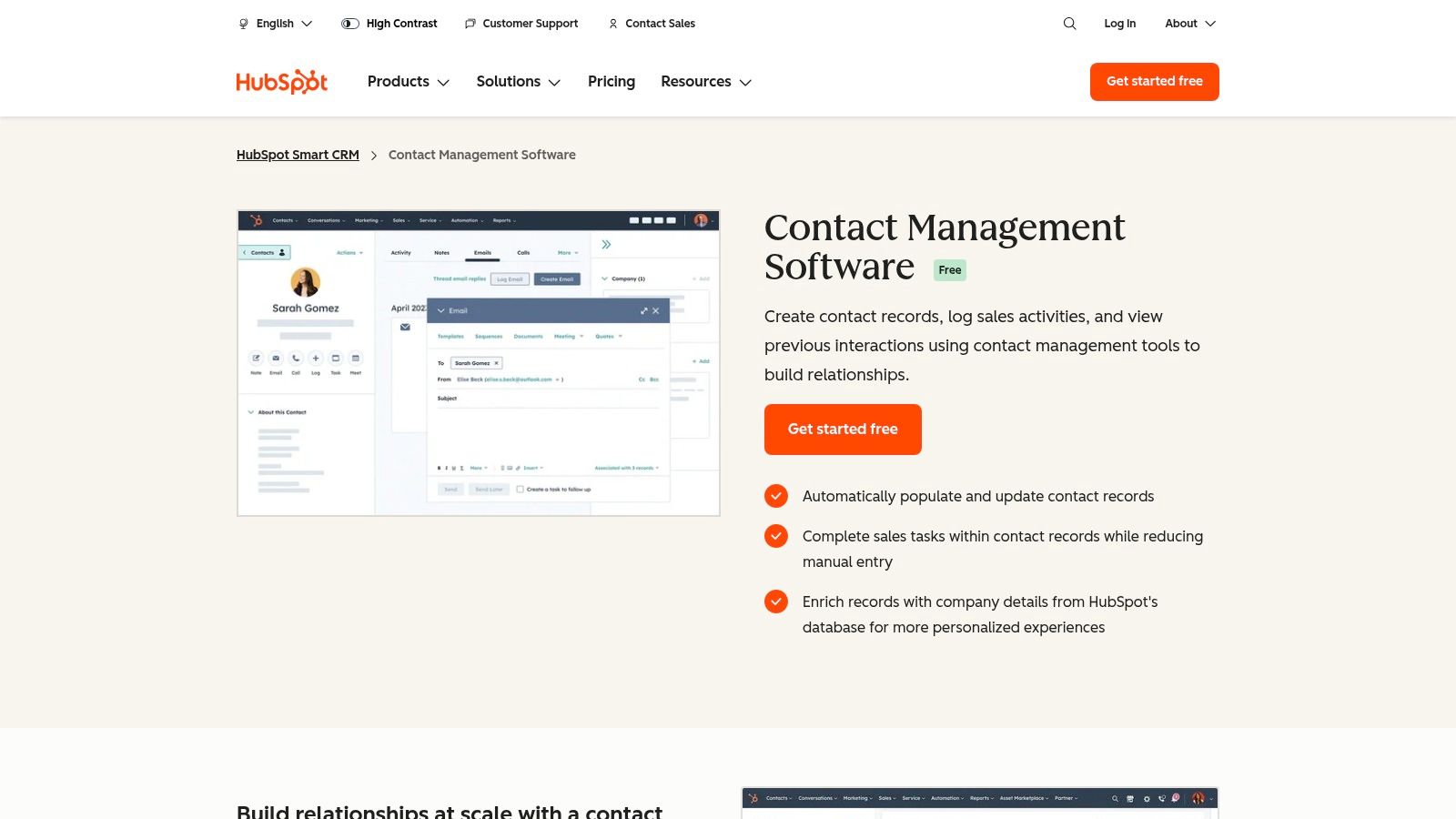
The platform excels at centralizing communication. Every email, call, meeting, and note is automatically logged on a unified contact timeline, giving your entire team context without needing to ask. HubSpot's ability to automatically enrich contact data by pulling information from its vast database is a significant time-saver.
Key Features & Use Cases
- Unified Contact Records: Automatically logs emails, calls, and meetings. Great for sales teams who need a complete history of interactions before a follow-up.
- Activity Timeline and Tasking: Assign tasks related to a contact directly from their record. This helps ensure no lead falls through the cracks.
- List Segmentation: Create dynamic or static lists based on contact properties and behaviors. Perfect for marketers launching targeted email campaigns.
- Free Communication Tools: Includes a shared team inbox, basic live chat, and form builders to capture new contacts directly from your website.
Pricing and Scalability
HubSpot's core CRM, which includes contact management, is free forever. This free tier is remarkably capable. As your business grows, you can add paid "Hubs" for Marketing, Sales, or Service. These hubs unlock advanced automation, in-depth reporting, and other powerful features, but the costs can increase significantly.
Pros:
- Extremely generous and capable free plan.
- Excellent user interface and onboarding resources.
- Scales into a full-funnel CRM platform.
Cons:
- Advanced features are locked behind expensive paid tiers.
- Add-on bundles can become complex and costly.
Website: https://www.hubspot.com/products/crm/contact-management
2. Zoho Bigin
Zoho Bigin is designed for small businesses that find spreadsheets cumbersome but aren't ready for a full-scale CRM. It offers a pipeline-centric approach to contact management, making it incredibly intuitive for sales-focused teams who need to visualize their deal flow from lead to close. Bigin strips away complexity, focusing on the essential tools needed to manage relationships effectively.
The platform’s strength lies in its simplicity and deep integration within the broader Zoho ecosystem. It provides a clear, visual pipeline where you can drag and drop deals between stages, with all related contacts, companies, and activities neatly attached. This makes it one of the best contact management software options for teams prioritizing ease of use and affordability.
Key Features & Use Cases
- Pipeline-Centric Views: Manage contacts and companies directly within customizable deal pipelines. Ideal for small sales teams needing to track lead progression visually.
- Built-in Telephony: Make and receive calls directly from the platform with options to log and record conversations. This is great for service or sales reps who spend significant time on the phone.
- Workflow Automation: Create simple, automated workflows for routine tasks like sending welcome emails or creating follow-up tasks when a deal moves to a new stage.
- Seamless Zoho Suite Integration: Works perfectly with other Zoho apps like Zoho Campaigns, Zoho Books, and Zoho Desk, creating a unified business operating system.
Pricing and Scalability
Zoho Bigin offers a free-forever plan for a single user, which includes essential features like pipelines and mobile apps. Paid plans are extremely affordable, starting with the Express tier at a low per-user monthly cost, which adds more pipelines and workflow rules. The Premier tier unlocks advanced features like custom fields and higher automation limits. While Bigin is powerful for small teams, significant growth might eventually require an upgrade to the more comprehensive Zoho CRM.
Pros:
- Very affordable entry-level pricing.
- Extremely easy to learn and purpose-built for small businesses.
- Excellent mobile apps for managing contacts on the go.
Cons:
- Lacks the deep reporting and enterprise features of full CRMs.
- Advanced capabilities often require purchasing other Zoho add-ons.
Website: https://www.bigin.com
3. Pipedrive
Pipedrive is a sales-focused CRM designed with a clear goal: to make selling simple. It centers its entire contact management philosophy around a visual sales pipeline, helping teams track leads and deals with exceptional clarity. This makes it a fantastic choice for sales teams who want a straightforward, activity-based tool without the complexity of an all-in-one marketing suite.
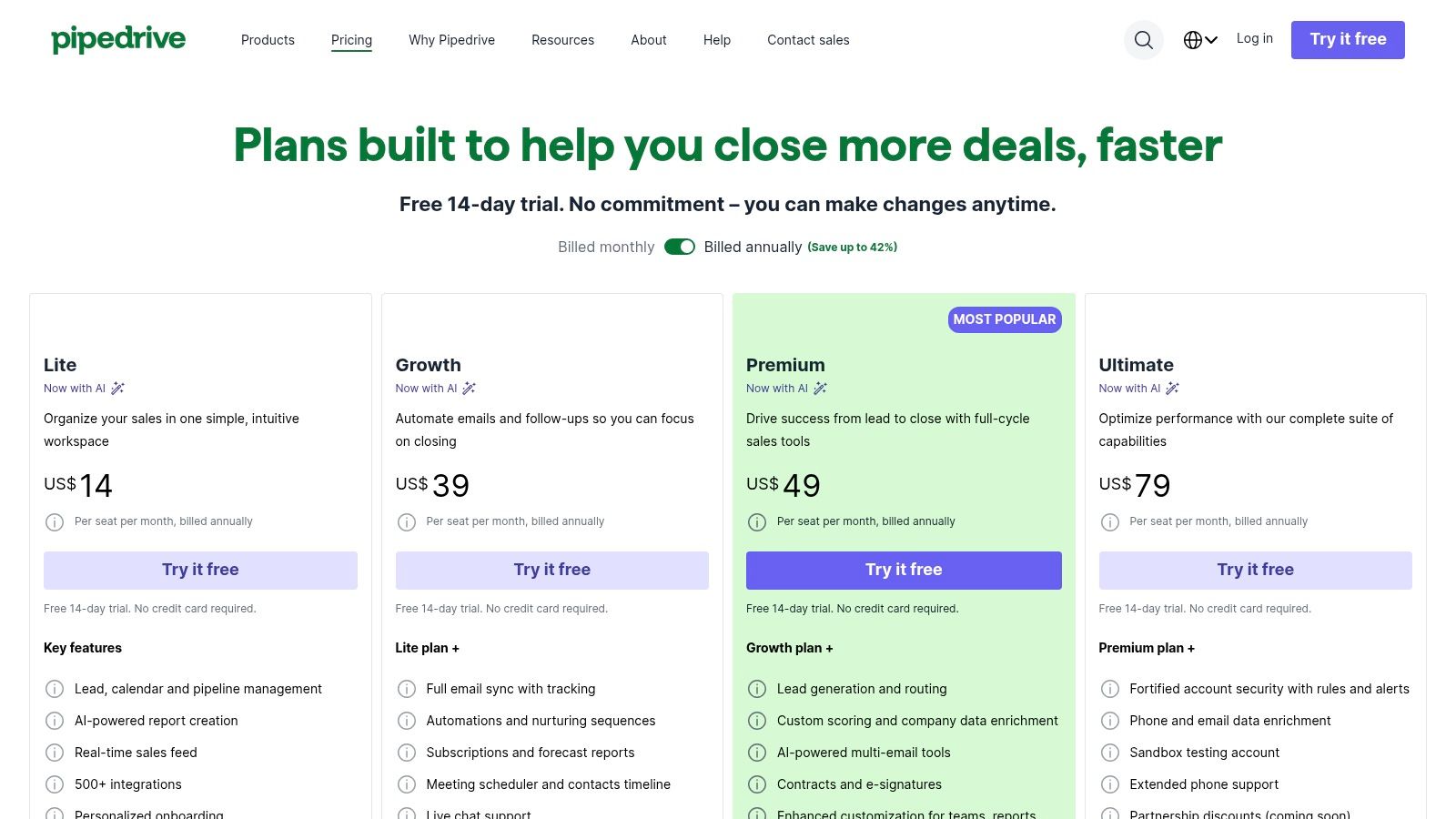
The platform’s strength lies in its intuitive, drag-and-drop interface that visualizes every stage of the sales process. Each contact record is tied directly to a deal, with a complete timeline of calls, emails, and scheduled activities. This ensures that every team member knows exactly what the next step is to move a contact forward. Effective contact management is crucial for growing your business, and learning about efficiently building a sales pipeline is a foundational step that Pipedrive's structure directly supports.
Key Features & Use Cases
- Visual Sales Pipeline: A Kanban-style view to track deals and associated contacts. Ideal for sales managers wanting a quick overview of team performance.
- Contact & Activity Timeline: Each contact record shows a full history of interactions and planned future activities. This helps sales reps prepare for calls and follow-ups.
- Email and Calendar Sync: Integrates with your inbox to log conversations and sync appointments automatically, reducing manual data entry.
- Reporting and Dashboards: Customizable reports to track sales KPIs, activity goals, and conversion rates, providing actionable insights for business development. Pipedrive can also be combined with various b2b lead generation tools to fill your pipeline.
Pricing and Scalability
Pipedrive offers several paid tiers, starting with the Essential plan, which provides core contact and pipeline management. As you move up to Advanced, Professional, and Enterprise plans, you unlock more automation, deeper integrations, and enhanced security features. Unlike HubSpot, there is no free-forever plan, but it offers a 14-day free trial.
Pros:
- Extremely intuitive interface that is easy to set up and use.
- Strong focus on sales activities and pipeline management.
- Broad integration marketplace with over 500 apps.
Cons:
- Lacks a free-forever plan.
- Advanced marketing features often require paid add-ons or integrations.
Website: https://www.pipedrive.com/en/pricing
4. Salesforce Sales Cloud
Salesforce Sales Cloud is the enterprise-grade titan of the CRM world, offering a contact management system that is profoundly deep and customizable. It's built for organizations that need more than a simple address book; they need a central nervous system for their entire sales operation. The platform is designed to manage complex relationships between contacts, accounts, and opportunities, making it a powerhouse for large or rapidly scaling teams.
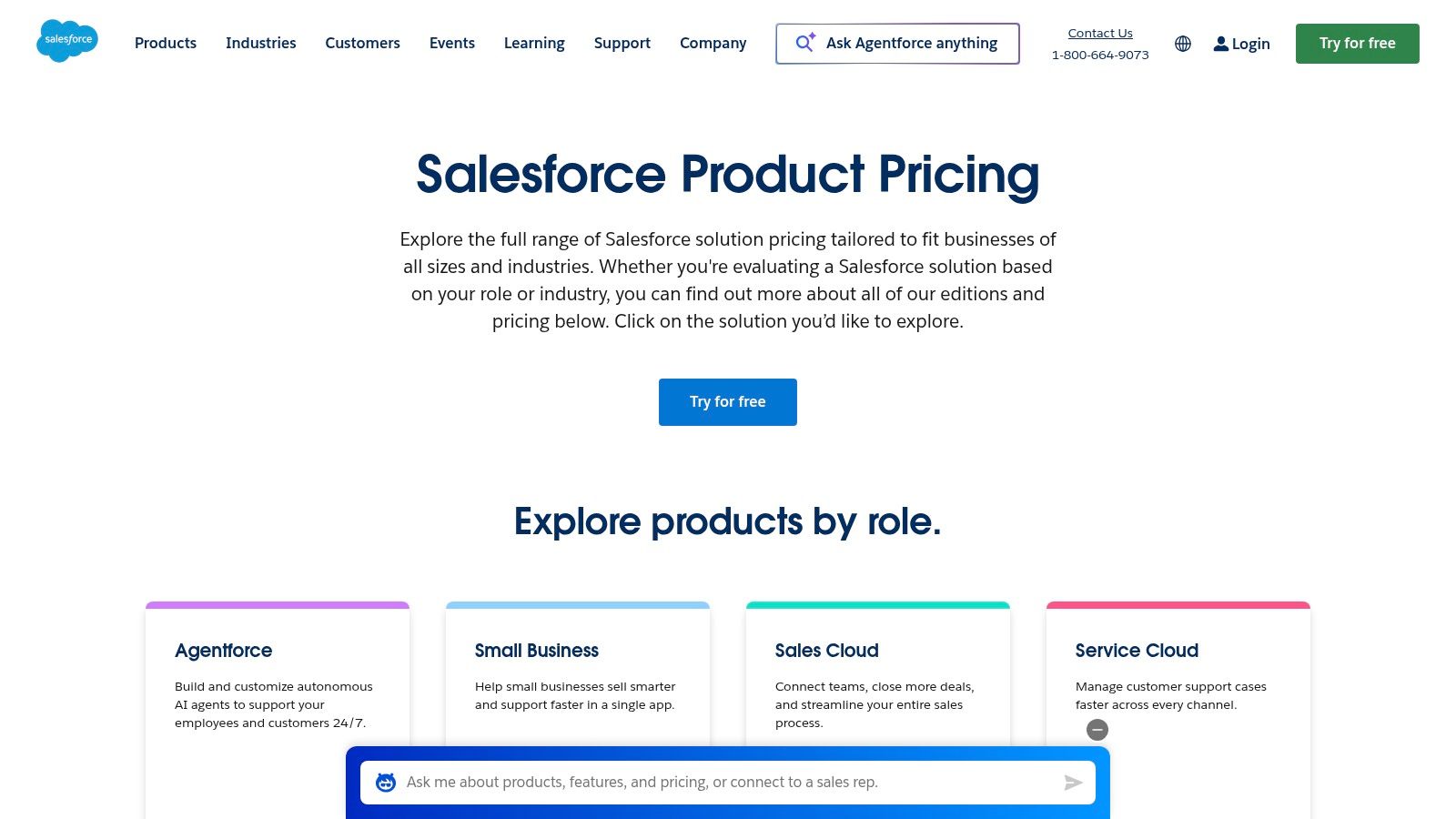
The true strength of Salesforce lies in its unparalleled ability to be molded to fit any business process. Its robust architecture supports custom objects, intricate workflow automation, and detailed permission settings, giving administrators granular control. This makes it one of the best contact management software options for businesses with unique sales cycles and data governance requirements. For those new to the space, it helps to understand the fundamentals of customer relationship management before diving into such a powerful tool.
Key Features & Use Cases
- Comprehensive Contact & Account Management: Link contacts to accounts, track roles, and map complex organizational hierarchies. Ideal for B2B sales teams managing multiple stakeholders in large deals.
- Workflow Automation: Create custom rules and automated processes for tasks like lead assignment, follow-up reminders, and data updates. This helps enforce sales processes and improve efficiency.
- Massive AppExchange Marketplace: Extend functionality with thousands of third-party apps for everything from e-signatures to marketing automation, creating a truly all-in-one solution.
- Advanced Analytics and AI: Utilize powerful, customizable reporting dashboards and leverage the Einstein AI add-on for predictive lead scoring and sales forecasting.
Pricing and Scalability
Salesforce operates on a per-user, per-month subscription model with several tiers, starting with the Starter Suite. While powerful, the total cost of ownership can be high, especially when factoring in add-ons, implementation, and potential consultant fees. It is designed to scale from small teams to global enterprises, but the pricing reflects its enterprise focus.
Pros:
- Extremely customizable and scalable to any business size or complexity.
- Vast ecosystem of integrations via the AppExchange.
- Strong administrative controls and security features.
Cons:
- Can have a steep learning curve for new users and admins.
- Higher total cost of ownership compared to simpler solutions.
- Pricing structure can be complex and expensive.
Website: https://www.salesforce.com/pricing
5. Contacts+
Contacts+ is a dedicated contact management app that excels at unifying contacts from multiple sources into a single, clean address book. Its primary strength lies in its powerful cross-platform syncing and intelligent data cleanup, making it a perfect fit for individuals and small teams overwhelmed by scattered contact information across various accounts and devices. It prioritizes the core function of managing contacts over broader CRM features.
The platform’s standout feature is its ability to automatically merge duplicates and enrich contact profiles. It can scan email signatures to capture new details and keep your information up-to-date with minimal effort. This focus on data integrity makes it one of the best contact management software options for those who simply want a smarter address book that works everywhere.
Key Features & Use Cases
- Multi-Account Sync: Connects and syncs contacts from Google, Apple (iCloud), and Microsoft (Outlook/Exchange). Ideal for professionals who use different platforms for personal and business life.
- Contact Enrichment and Deduplication: Automatically finds and merges duplicate contacts and adds photos, job titles, and social profiles. This is a core function of many data quality management tools.
- Team-Shared Address Book: Allows teams to share and collaborate on a central contact list, ensuring everyone has access to the same up-to-date information.
- Cross-Platform Apps: Offers dedicated apps for Web, iOS, Android, and Mac, plus a Chrome extension for easy contact capture.
Pricing and Scalability
Contacts+ offers a free Basic plan for individuals to sync one account. The Premium plan, aimed at individuals, adds syncing for up to five accounts and more advanced features for a monthly fee. The Teams plan provides a shared contact database and administrative controls, with pricing based on the number of users. The pricing is straightforward and affordable for its focused feature set.
Pros:
- Excellent at syncing and deduplicating contacts across multiple platforms.
- Simple, clean interface focused purely on contact management.
- Automatic enrichment features are a significant time-saver.
Cons:
- Lacks the advanced sales and marketing features of a full CRM.
- May be too simple for businesses needing deal pipelines or marketing automation.
Website: https://www.contactsplus.com
6. Cloze
Cloze positions itself as a smart, relationship-focused contact manager that acts like a personal assistant. It stands out by using AI to automatically pull together all your interactions from email, calendars, phone calls, and social media into a single, unified view for each contact. This “no data entry” approach makes it ideal for busy professionals who need context without manual logging.
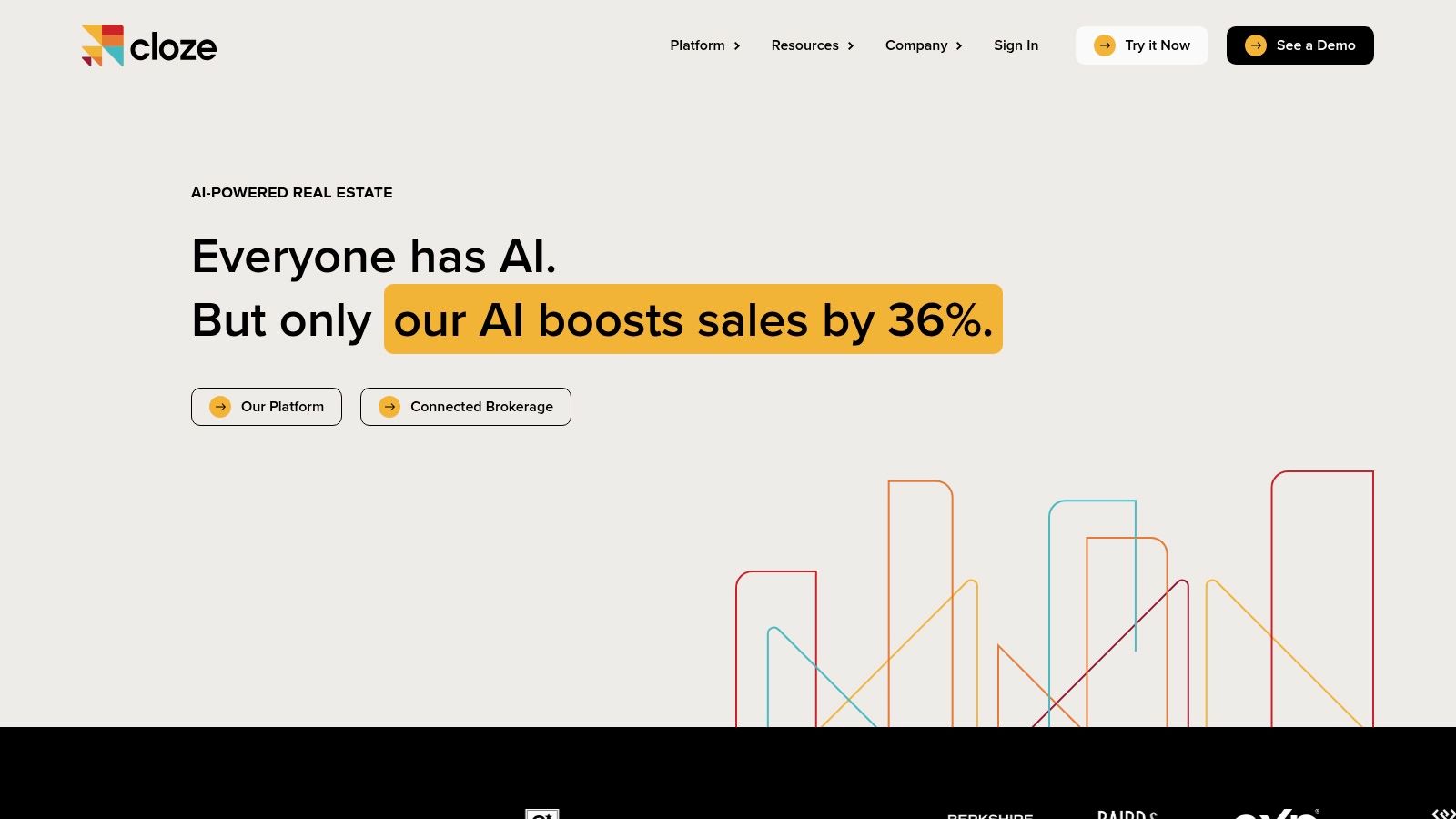
The platform intelligently identifies key people and companies, prompting you to follow up at just the right time to keep relationships warm. It learns who is important to you based on your communication patterns, ensuring critical contacts don't slip through the cracks. This automation-first philosophy is what makes it some of the best contact management software for individual productivity.
Key Features & Use Cases
- Unified Contact Timeline: Automatically syncs and organizes emails, meetings, calls, and social media interactions. Perfect for consultants or freelancers managing a diverse client base across multiple channels.
- AI-Driven Reminders: Proactively reminds you to re-engage with contacts you haven't spoken to in a while. This is excellent for account managers focused on relationship building and retention.
- “No Data Entry” Approach: Creates and enriches contact profiles automatically, saving significant time. Great for real estate agents or anyone who meets many new people regularly.
- Team Collaboration: Allows for shared contacts, timelines, and deal management, with clear permission settings to control visibility.
Pricing and Scalability
Cloze offers a 14-day free trial. After that, plans start with Cloze Pro at $19.99 per user/month, which is designed for individuals. The Business plans (Silver, Gold, Platinum) add team features, deal tracking, and deeper integrations, with prices increasing accordingly. It's a scalable solution that starts with personal productivity and grows into a lightweight team CRM.
Pros:
- Excellent automation saves a huge amount of data entry time.
- Strong focus on personal productivity and relationship management.
- Intelligent AI provides useful, actionable reminders.
Cons:
- The interface is different from traditional CRMs and has a learning curve.
- Primarily focused on relationships, may lack features for complex sales funnels.
Website: https://www.cloze.com
7. BusyContacts
For Mac users who want a professional-grade contact manager that lives on their desktop, BusyContacts is a top-tier choice. It elevates the standard address book into a powerful, mini-CRM by integrating deeply with its sister calendar app, BusyCal. This creates a cohesive ecosystem where your contacts, communications, and schedule are tightly interwoven, offering a speed and responsiveness that web-based apps can't match.
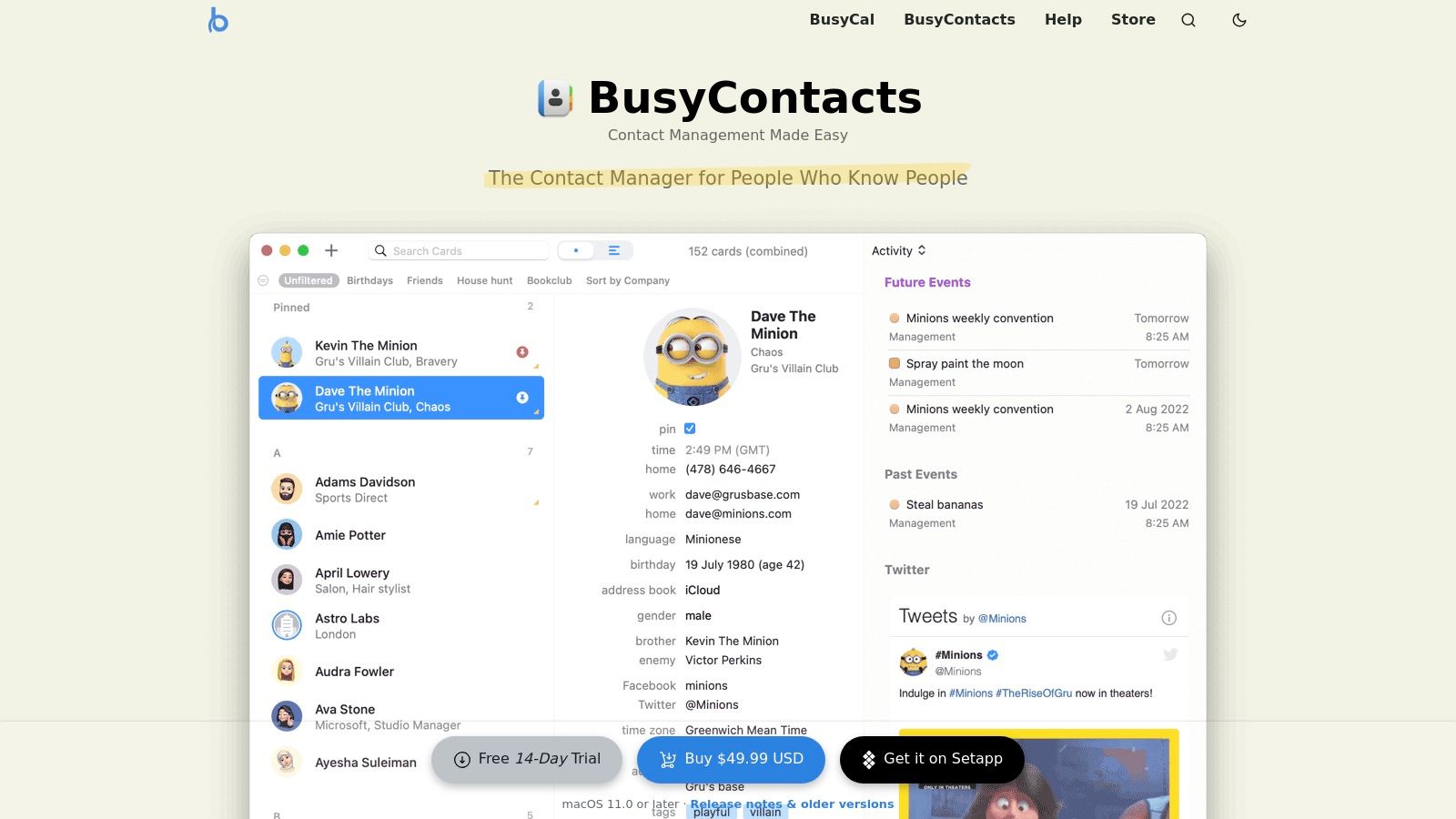
The platform stands out by bringing CRM-like features into a native macOS interface. You can tag contacts, create powerful smart filters that update automatically, and view a chronological Activity List that shows all your interactions, including emails, messages, and scheduled meetings. This focus on a fast, integrated, and local experience makes it some of the best contact management software for individual professionals and consultants who work exclusively within the Apple ecosystem.
Key Features & Use Cases
- Activity Timeline: Integrates with Mail, Messages, and BusyCal to show a complete history of interactions. Ideal for freelancers needing context before a client call.
- Smart Filters and Tagging: Organize contacts with flexible tags and create dynamic smart lists based on any field. Perfect for segmenting clients by project or status.
- Social Media Integration: Pulls in profile pictures and links from social networks like Twitter, enriching your contact records automatically.
- Broad Sync Support: Natively syncs with iCloud, Google, Exchange, and other CardDAV services, keeping your contacts consistent across all devices.
Pricing and Scalability
BusyContacts offers a refreshing pricing model. You can purchase a perpetual license directly from their website, which includes updates for the current major version. They also offer a subscription through the Mac App Store. While it's built for individual power users rather than large, collaborative teams, its robust feature set provides significant value without recurring monthly fees.
Pros:
- Fast, powerful native macOS experience.
- Perpetual license option offers great long-term value.
- Excellent integration with BusyCal and other Mac apps.
Cons:
- Strictly a Mac-only application.
- Lacks the advanced team collaboration features of cloud-based CRMs.
Website: https://busymac.com/busycontacts
8. Streak
Streak transforms your Gmail inbox into a flexible, lightweight contact management and CRM platform. Its unique value proposition is that it lives entirely within the Google Workspace ecosystem, eliminating the need to switch between your email and a separate CRM tool. This makes it a top choice for individuals and teams who spend the majority of their day in Gmail and need a simple way to track pipelines, deals, and contacts.
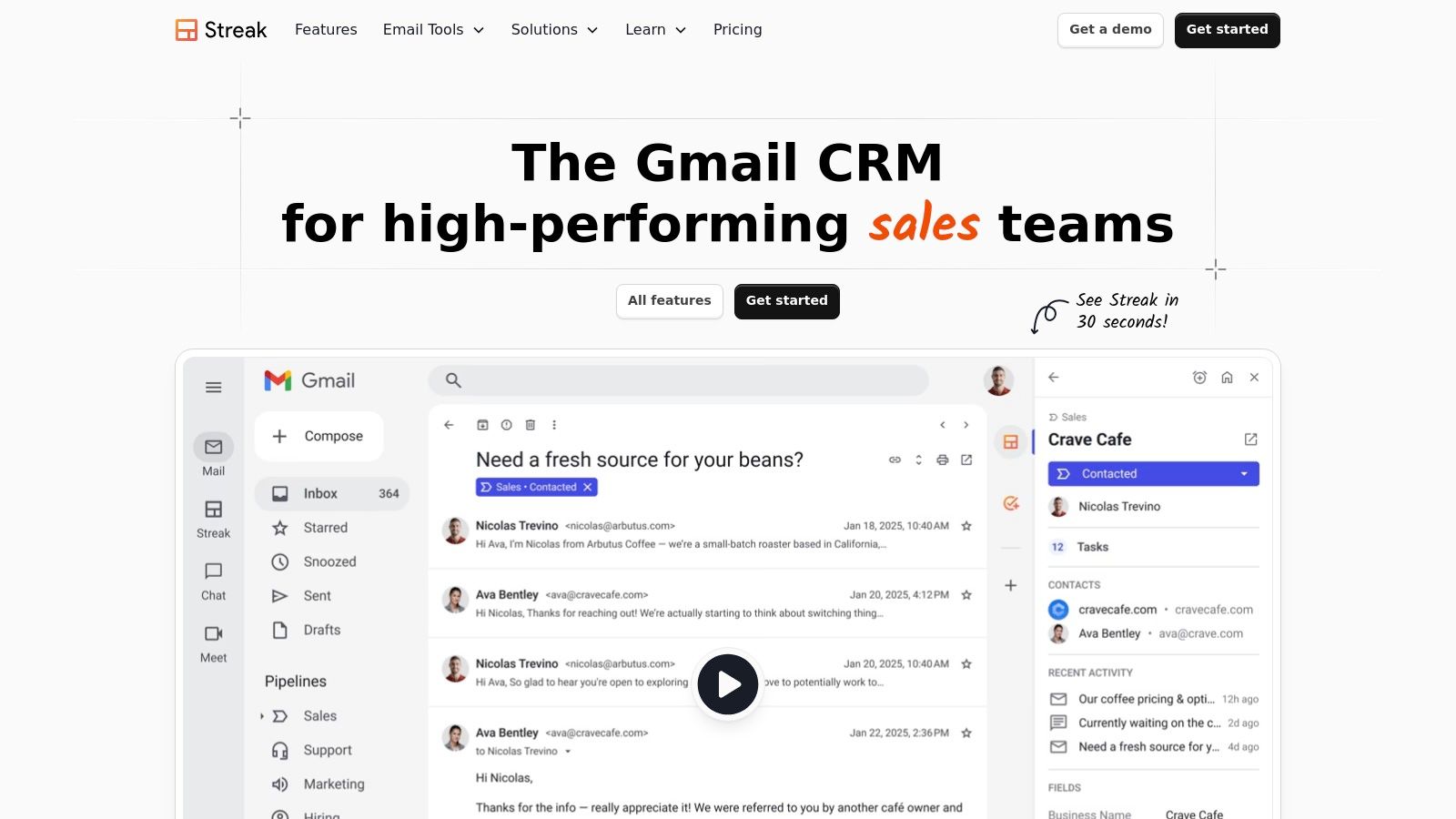
The platform seamlessly integrates contacts and pipelines directly alongside your emails, allowing you to organize conversations by deal stage or category. By bringing powerful CRM features like email tracking, mail merge, and snippets into the familiar Gmail interface, Streak reduces friction and boosts productivity for sales, support, and hiring teams.
Key Features & Use Cases
- Gmail-Integrated Pipelines: Manage contacts and track deals, support tickets, or hiring candidates through customizable stages directly in your inbox. This is perfect for sales reps who want to visualize their pipeline without leaving Gmail.
- Email Power Tools: Includes mail merge, email tracking, and reusable snippets to streamline outreach. Marketers can use this to send personalized bulk emails and track engagement.
- Contact and Organization Management: Automatically links all emails and files from a contact into a central "box," creating a complete interaction history within Google Workspace.
- Shared Inboxes & Collaboration: Share pipelines and email conversations with your team to ensure everyone is on the same page without messy email forwarding.
Pricing and Scalability
Streak offers a free plan for individual users that includes basic CRM features and up to 50 mail merge emails per day. Paid plans start with the Solo plan ($15/user/month) for professionals, the Pro plan ($49/user/month) for growing teams needing more collaboration features, and the Enterprise plan ($129/user/month) for advanced needs. The platform is best suited for small to mid-sized teams embedded in Google's ecosystem.
Pros:
- Excellent integration with Gmail, minimizing context switching.
- Quick to set up and intuitive for Google Workspace users.
- Solid free plan with useful email productivity tools.
Cons:
- Limited functionality outside of the Gmail/Google ecosystem.
- Can feel less powerful than standalone CRM solutions.
Website: https://streak.com
9. Microsoft 365 (Outlook/People)
For organizations deeply embedded in the Microsoft ecosystem, the built-in contact management within Outlook and Microsoft 365 is a natural and powerful choice. It leverages the tools your team already uses daily, like email and calendars, turning them into a cohesive contact hub. This native integration eliminates the need for a separate system, making it ideal for businesses prioritizing security, compliance, and streamlined internal collaboration over advanced sales features.
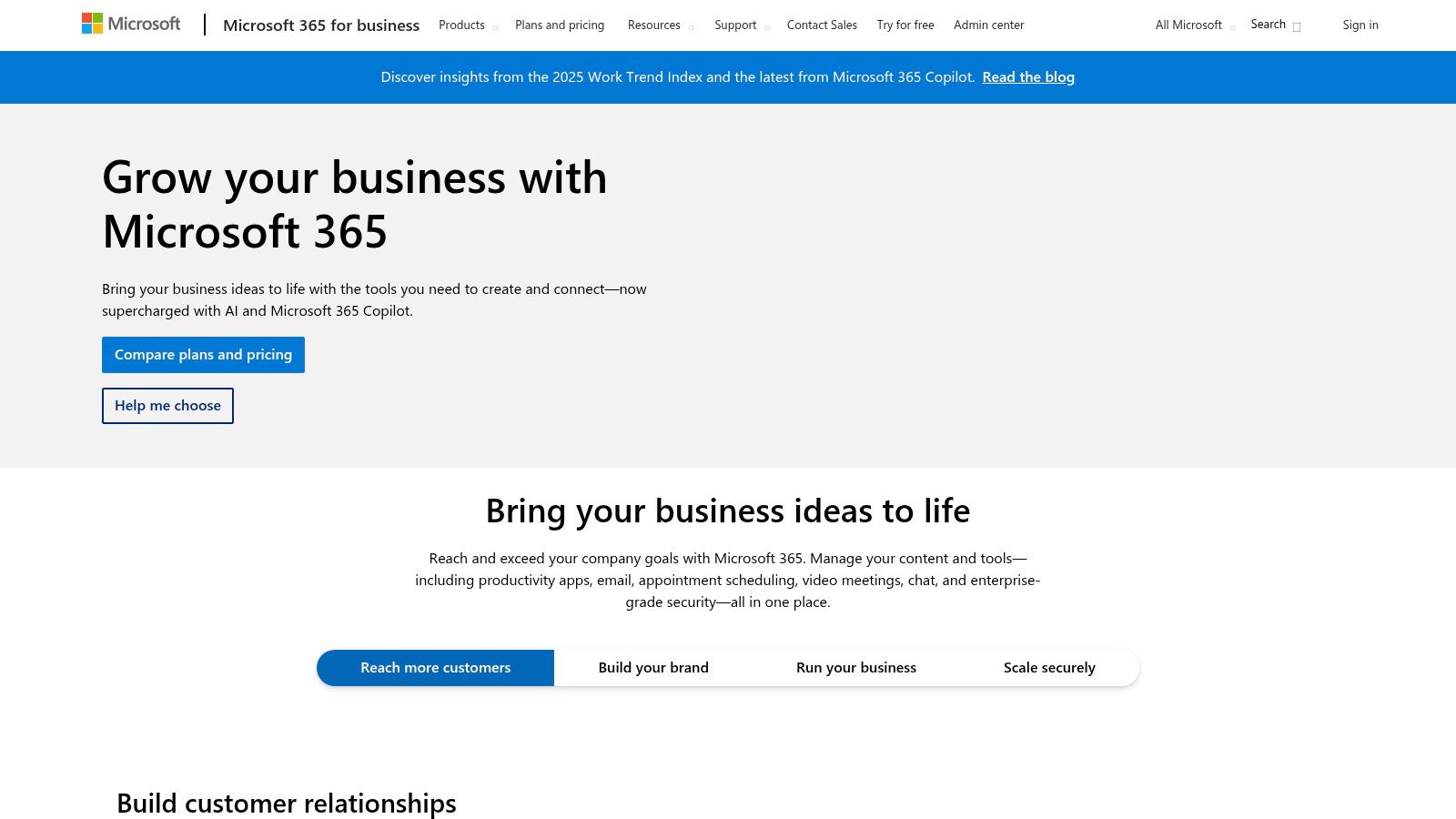
The platform’s strength lies in its unified nature. Contact information is seamlessly available across Outlook on the web, desktop, and mobile, ensuring your team has access anywhere. When combined with Exchange and Microsoft Entra ID (formerly Azure AD), it creates a robust, organization-wide address book that is centrally managed, making it one of the best contact management software options for companies with strict IT governance.
Key Features & Use Cases
- Deep Outlook Integration: Create and edit contacts directly from an email signature. Useful for quickly saving information from new prospects without leaving your inbox.
- Organization-Wide Address Book: Provides a centralized, managed directory of all internal and external contacts. Perfect for large enterprises needing a single source of truth for contact data.
- Enterprise Security and Compliance: Leverages Microsoft 365's security framework for data protection and access controls, meeting the needs of regulated industries.
- Optional AI with Copilot: On certain plans, Copilot can summarize contact interactions and draft emails, which helps sales teams increase their communication efficiency.
Pricing and Scalability
Contact management is a core feature included with all Microsoft 365 Business and Enterprise plans, which start at $6.00 per user/month. The functionality is robust for communication and organization. For full CRM capabilities, businesses typically need to upgrade to Microsoft Dynamics 365. The advanced AI assistant, Copilot, is available as an add-on or included in higher-tier enterprise plans.
Pros:
- Seamlessly integrated with Outlook email and calendars.
- Strong enterprise-grade administration and security features.
- No additional cost if you already use Microsoft 365.
Cons:
- Lacks true CRM functionality without purchasing Dynamics 365.
- The AI assistant, Copilot, requires an additional subscription cost.
Website: https://www.microsoft.com/en-us/microsoft-365/business
10. Apple App Store
For users embedded in the Apple ecosystem, the App Store isn't a single software but a curated marketplace to find the best contact management software tailored for iOS and macOS. It offers a secure and streamlined way to discover, purchase, and manage specialized apps that go far beyond the native Contacts app. This approach is ideal for individuals, freelancers, and small teams who prioritize a native device experience and simplicity.
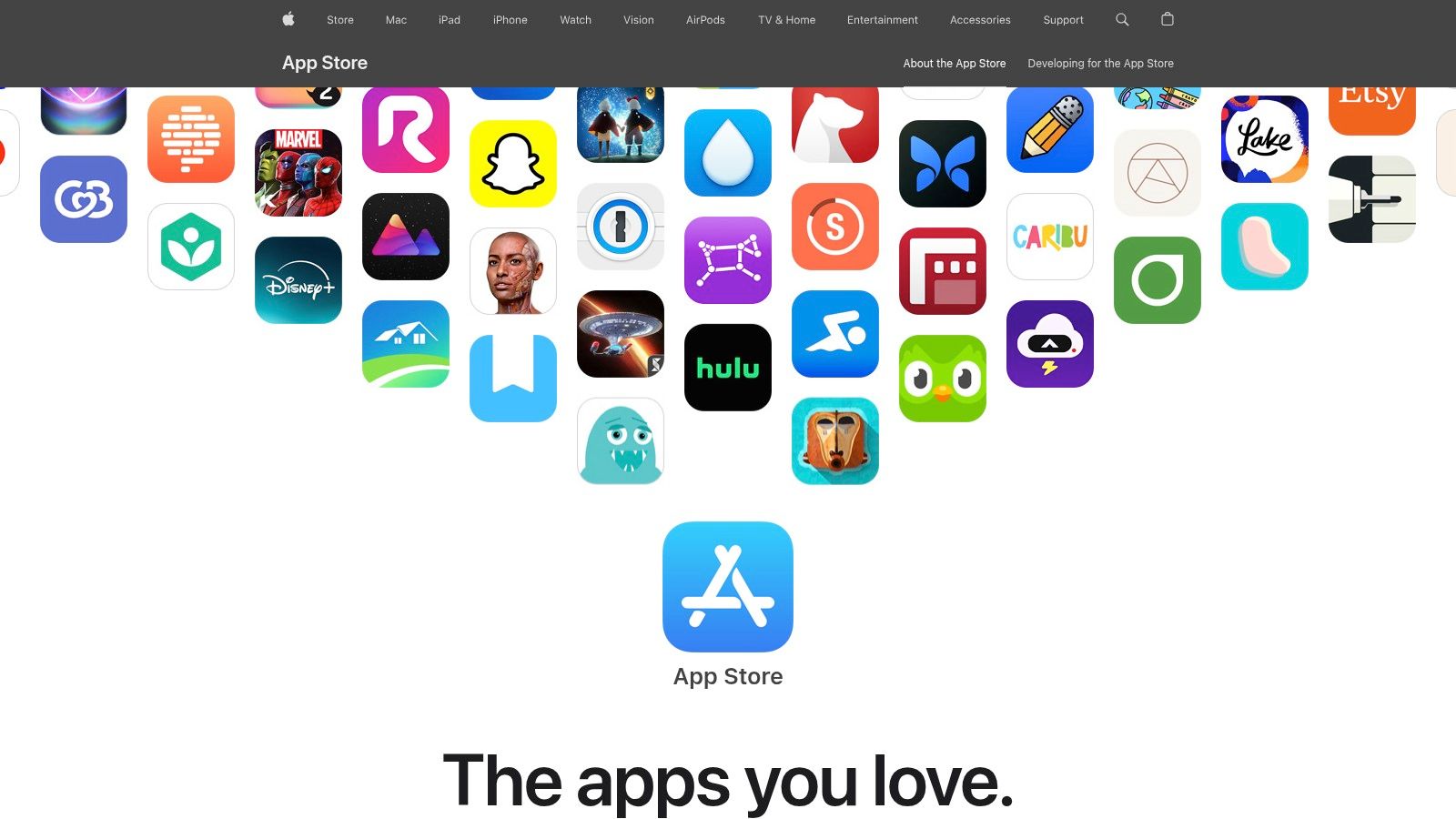
The platform’s strength lies in its variety and trusted environment. User reviews, editor's picks, and detailed app descriptions help you vet options before downloading. Managing subscriptions or making in-app purchases is handled seamlessly through your Apple ID, providing a layer of security and convenience that standalone web services can't always match.
Key Features & Use Cases
- Curated App Listings and User Reviews: Easily compare different contact managers based on real user feedback. Perfect for finding niche apps, like those that specialize in scanning business cards or cleaning up duplicate contacts.
- Centralized Apple Billing: Manage all app subscriptions in one place with trusted payment processing. This simplifies financial tracking for freelancers and small businesses.
- Family Sharing and iCloud Sync: Share purchased apps with family members and ensure your contacts are always synced across your iPhone, iPad, and Mac, providing a seamless multi-device workflow.
- Discover Niche Solutions: Find specialized tools for specific needs, such as personal CRMs for managing relationships or advanced group managers for community organizers.
Pricing and Scalability
Pricing is determined by individual app developers and varies widely. You can find everything from free, ad-supported apps to powerful premium tools with monthly or annual subscriptions. While the platform itself is free to use, the cost of the software you choose can range from a one-time purchase of a few dollars to recurring fees for more advanced, professional-grade systems.
Pros:
- Safe and trusted environment with verified apps and regular updates.
- Huge selection of apps to fit different needs and budgets.
- Simplified billing and subscription management through your Apple ID.
Cons:
- Exclusively for iOS and macOS devices, offering no cross-platform support for Windows or Android.
- The quality and feature set can vary dramatically between different third-party apps.
Website: https://apps.apple.com/us/search?term=contact%20manager
11. Google Play Store
For Android users, the Google Play Store isn't a single piece of software but an entire marketplace dedicated to finding the right tool for the job. It offers a vast ecosystem of contact management apps, from simple address book organizers to more complex business-focused utilities. This makes it a unique entry on this list, serving as a gateway to countless specialized solutions rather than being one itself.
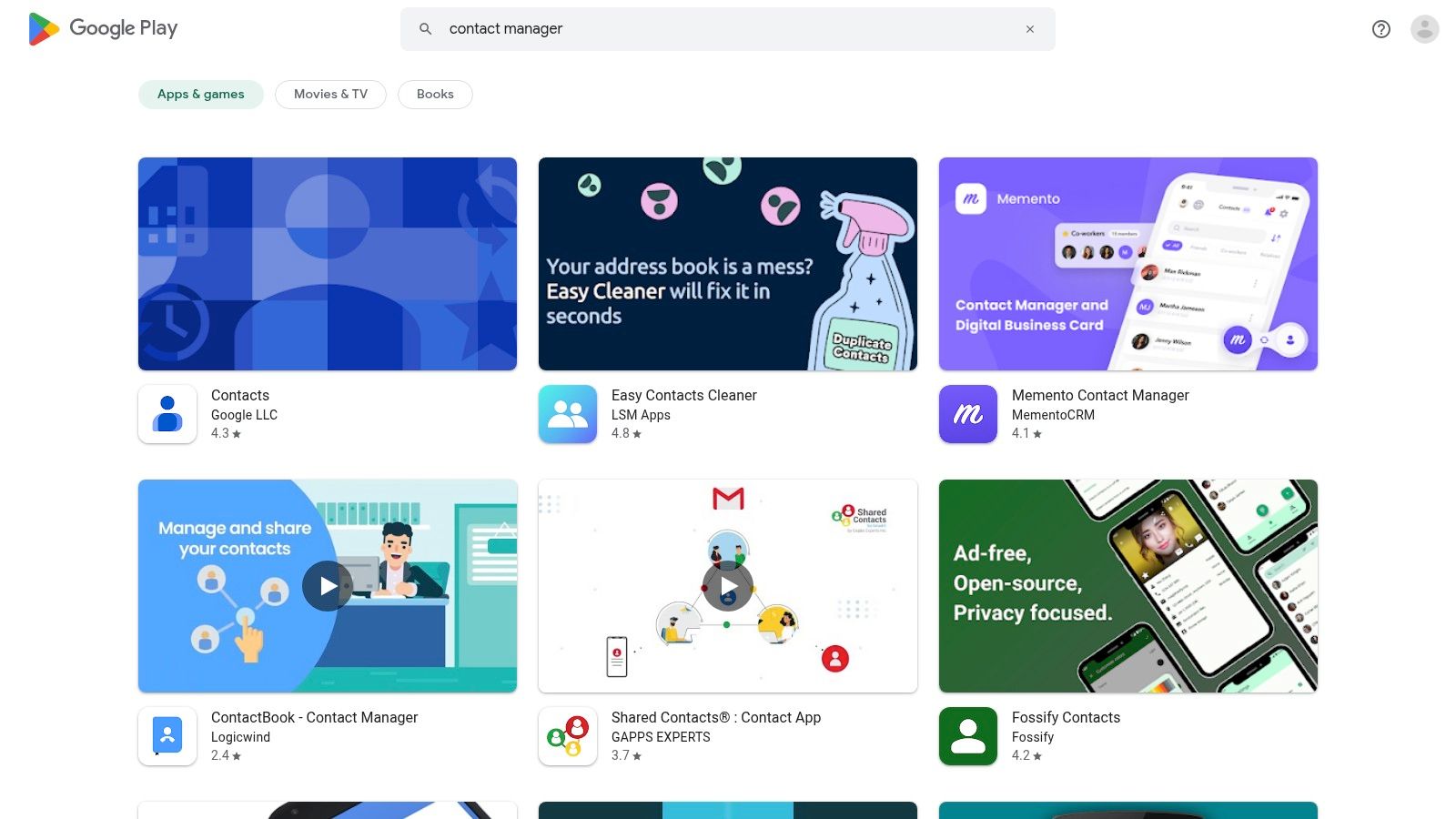
The platform's strength lies in its diversity and user-driven curation. You can find apps for specific needs like contact backup, duplicate merging, or call logging, all in one place. User reviews, ratings, and download counts provide valuable social proof, helping you vet potential apps before committing. This approach empowers users to find a highly specific, often low-cost, solution tailored to their personal or small business needs.
Key Features & Use Cases
- Wide Variety of Utilities: Hosts thousands of apps for specific tasks. Ideal for users needing a simple tool to clean up duplicates or back up contacts without a full CRM.
- User Reviews and Ratings: Provides real-world feedback to gauge an app's quality and reliability. Crucial for sorting through the massive selection to find quality software.
- Google Ecosystem Integration: Purchases and installations are tied to your Google account, simplifying management across devices and providing a secure billing system.
- Device Compatibility Checks: Automatically verifies if an app will work with your specific Android device, preventing installation issues.
Pricing and Scalability
Pricing on the Google Play Store varies dramatically, from completely free, ad-supported apps to one-time purchases and monthly subscriptions. This flexibility is a major advantage for individuals and micro-businesses with tight budgets. However, these apps rarely offer the scalability of a dedicated CRM platform, as they are often designed to solve one problem well rather than grow with a business.
Pros:
- Extensive variety of apps for every niche and budget.
- Easy, one-click installation and automated updates.
- User reviews help identify high-quality applications.
Cons:
- Exclusively for the Android operating system.
- App quality and security can vary significantly.
- Lacks the integrated, all-in-one nature of a true CRM.
Website: https://play.google.com/store/search?q=contact%20manager&c=apps
12. G2
While not a contact management tool itself, G2 is an indispensable resource for finding the right one. It's a leading software marketplace and review platform where real users share detailed feedback, making it a crucial first stop for anyone researching the best contact management software. Instead of relying solely on vendor marketing, you can compare dozens of options based on verified peer experiences.
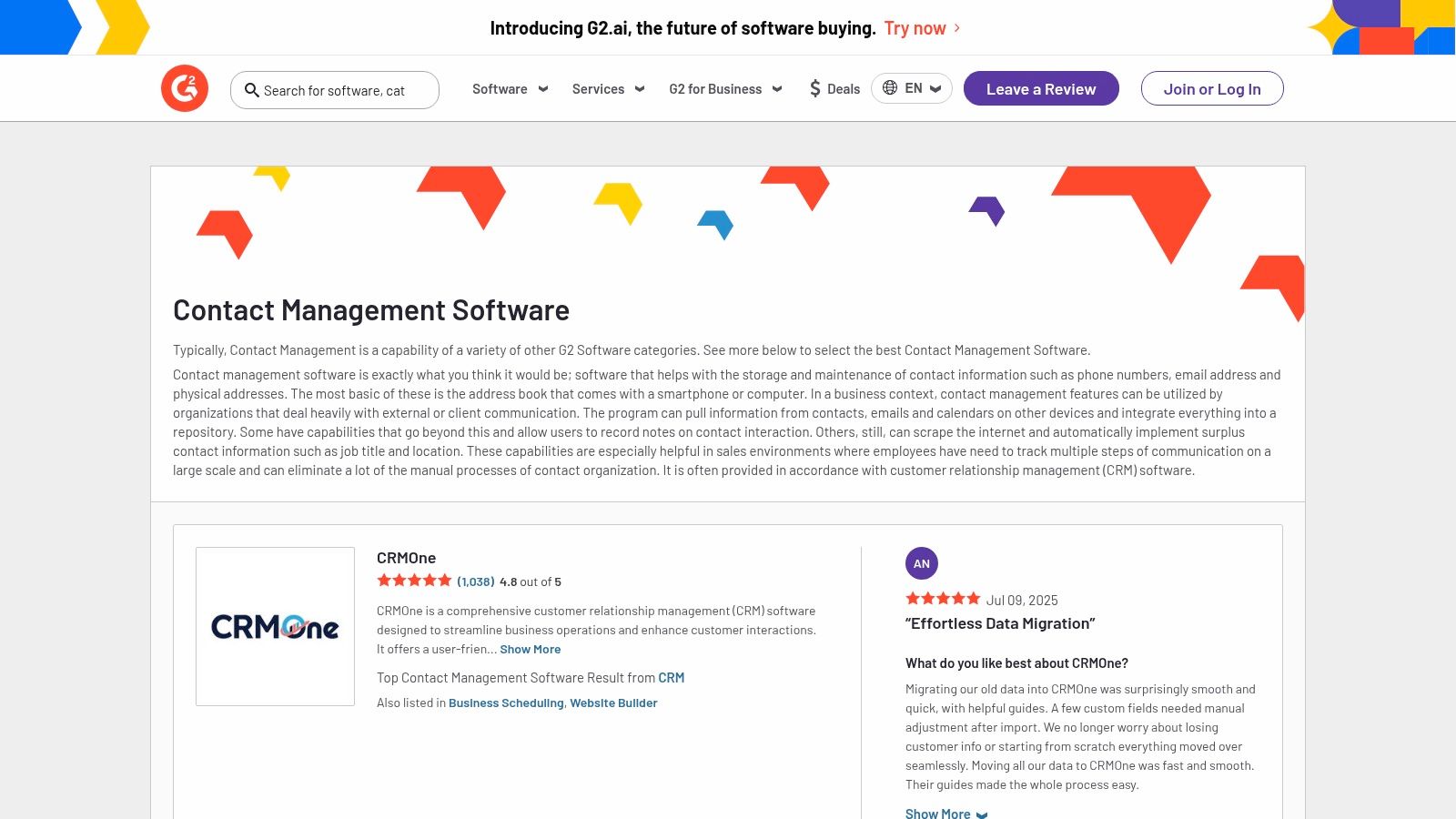
The platform's strength lies in its structured, data-driven approach. You can filter solutions by company size, specific features, user satisfaction ratings, and market presence. This allows you to quickly narrow down a vast market to a manageable shortlist of relevant tools that fit your specific needs and budget.
Key Features & Use Cases
- Verified User Reviews: Access thousands of in-depth reviews from actual users. Ideal for understanding the real-world performance of a platform before committing.
- Comparison Grids: Use the G2 Grid to visually compare software based on market presence and user satisfaction, helping identify market leaders and niche innovators.
- Advanced Filtering: Filter tools by features like contact import/export, lead management, or integration capabilities to find software that meets your technical requirements.
- Direct Trial Links: G2 provides direct, vetted links to start free trials or request demos from vendors, streamlining the evaluation process.
Pricing and Scalability
G2 is completely free for buyers and researchers to use. The platform makes money through vendors who pay for enhanced profiles and lead generation features. For users, access to all reviews, comparison tools, and reports costs nothing.
Pros:
- Provides authentic, unbiased peer feedback.
- Excellent filtering and comparison tools to create a shortlist.
- Direct links to vendor sites for trials and purchases.
Cons:
- Pricing information can sometimes be outdated; always verify on the vendor's official site.
- The sheer volume of options can be overwhelming without a clear idea of your needs.
Website: https://www.g2.com/categories/contact-management
Top 12 Contact Management Software Comparison
| Product | Core Features | User Experience & Quality | Value Proposition | Target Audience | Price Points |
|---|---|---|---|---|---|
| HubSpot | Unified contacts, activity timeline, segmentation | Intuitive, strong docs, scalable CRM | Free tier, grows with business | SMBs to enterprises | Free to premium tiers |
| Zoho Bigin | Pipeline views, mobile, basic automation | Easy to learn, lightweight | Affordable, purpose-built for small biz | Small businesses | Low entry price |
| Pipedrive | Contact timelines, kanban pipelines, reports | Intuitive, fast setup | Sales-focused, many integrations | Sales teams | Paid tiers, add-ons |
| Salesforce Sales Cloud | Advanced records, automation, AI | Customizable, enterprise-grade | Highly scalable, deep customization | Large enterprises | High, complex pricing |
| Contacts+ | Multi-account sync, enrichment, shared address book | Focused on contacts, mobile/web apps | Easy cross-platform sync | Individuals, small teams | Subscription based |
| Cloze | AI contact capture, reminders, sharing | Automated, people-centric | Boosts productivity with AI | Relationship managers | Subscription based |
| BusyContacts | Smart filters, timeline, macOS native | Fast, professional, mac-only | Native Mac app with perpetual license | Mac users, professionals | One-time or subscription |
| Streak | Gmail pipelines, mail merge, tracking | Minimal context switch, fast setup | Full Gmail integration | Google Workspace users | Free and paid tiers |
| Microsoft 365 (Outlook) | Outlook contacts, org address book, security | Integrated with MS365 suite | Enterprise security and compliance | Microsoft ecosystem users | Subscription (MS365 plans) |
| Apple App Store | Curated contact apps, reviews, family sharing | Trusted, secure app marketplace | Wide app variety, easy management | iOS/macOS users | Varies by app |
| Google Play Store | Contact tools, reviews, billing | Wide selection, easy installs | Android-focused, many pricing options | Android users | Varies by app |
| G2 | Software reviews, pricing, alternatives | Peer feedback, detailed filters | Helps shortlist and evaluate vendors | Buyers/researchers | Free access |
Making Your Final Decision
We've explored a comprehensive landscape of contact management software, from all-in-one CRM giants like HubSpot and Salesforce to specialized tools like Streak and BusyContacts. Sifting through features, pricing tiers, and ideal use cases can feel overwhelming, but the goal is simple: find the platform that empowers your team to build stronger relationships and drive growth, not one that adds another layer of administrative busywork.
The right choice hinges entirely on your unique operational DNA. A small, agile marketing agency and a large, enterprise sales team have vastly different needs, and the best contact management software for one could be a frustrating bottleneck for the other.
Key Takeaways: Matching the Tool to the Team
Let's distill our findings into a few core principles to guide your final choice. Your decision should be a strategic one, not just a technical one.
- For Startups and SMBs: HubSpot's free CRM and Zoho Bigin offer incredible value. They provide a robust foundation for organizing contacts and managing early-stage sales processes without a significant financial commitment. Their scalability ensures they can grow alongside your business.
- For Sales-Focused Teams: Pipedrive is the clear winner for organizations that live and breathe the sales pipeline. Its visual, activity-based approach keeps reps focused on closing deals. For larger teams needing advanced forecasting and customization, Salesforce Sales Cloud remains the industry standard, offering unparalleled power at a higher price point.
- For Individuals and Micro-Businesses: Simplicity is key. Contacts+ excels at unifying contacts from multiple sources, while Cloze acts as a personal relationship manager, automatically tracking interactions. For those embedded in a specific ecosystem, Streak (for Gmail) and BusyContacts (for Apple) provide seamless, native integration.
Your Action Plan for Choosing the Right Software
Information alone won't solve your contact management challenges. Now it's time to take decisive, practical steps to find the perfect fit.
- Define Your Core Needs: Before you click "Sign Up" on a free trial, list your top three to five "must-have" features. Is it a visual sales pipeline? Seamless email integration? Advanced reporting? This list will be your compass.
- Involve Your Team: The best tool is the one that gets used. Select your top two or three contenders and get your team involved in the trial period. A platform that one person loves might be completely unintuitive for the rest of the team. Gather honest feedback.
- Test Real-World Scenarios: Don't just import a few test contacts. Run a small, real-world project through the software. Track a lead from initial contact to a closed deal. Log a customer support interaction. See how the tool performs under the pressure of your actual workflow.
- Consider Long-Term Growth: The software that fits you today might not fit you in two years. Look at the platform's higher-tier plans. Does it offer the automation, integration, and reporting capabilities you'll need as you scale? Switching systems is disruptive, so choosing a tool with a clear growth path is a wise investment.
Ultimately, selecting the best contact management software is about finding a central hub for your most valuable asset: your relationships. It should bring clarity to your communications, streamline your processes, and free up your team to do what they do best. Take your time, test thoroughly, and choose the platform that feels like a natural extension of your team's workflow. The right tool won't just store your contacts; it will help you transform them into lasting business relationships.

